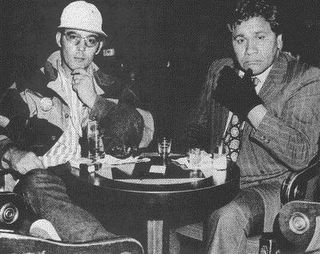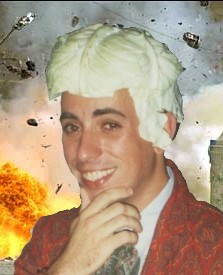goodbye, you weird #$%@er
Welcome back, friends. It's me, The Haiku Master, with my final thoughts on the untimely death of the infamous, nefarious, pirate king of gonzo journalism, Dr. Hunter Stockton Thompson.

Two Dead Men: Hunter S. Thompson (Left) and Oscar Zeta Acosta, Circa 1971
Based on the latest round of follow-up reports, the leading wisdom has it that H.S.T. blew his own head off in reaction to his rapidly declining health, which was preventing him from living the kind of life he preferred to live: Wild. Rambunctious. Kinetic. These traits don't come easy to a 67-year-old man who had undergone hip replacement surgery and a broken leg over a year's time. But would that alone be enough to drive a warrior like Thompson to suicide? Were there other thoughts in play?
In 1964, Thompson wrote an article for The National Observer entitled "What Lured Hemingway to Ketchum?" (The article is reprinted in Thompson's The Great Shark Hunt.) In 1961, another honored American writer, Ernest Hemingway, also committed suicide, only with a shotgun. A year earlier, Hemingway had relocated to a very small, out of the way town in Idaho called Ketchum. Thompson's piece, obviously, was an exploration of what had brought "Papa" there, and ultimately to his death.
There are more than a few interesting passages in it:
"'That poor old man. [Hemingway] used to walk out there on the road in the evenings. He was so frail and thin and old-looking that it was embarrassing to see him. I was always afraid a car would hit him, and that would have been an awful way for him to go.'"
And:
"'We do not have great writers,' [Hemingway] explains to the Austrian in Green Hills of Africa. 'Something happens to our good writers at a certain age....You see we make our writers into something very strange....We destroy them in many ways.' But Hemingway himself never seemed to discover in what way he was being 'destroyed,' and so he never understood how to avoid it."
And:
"'Well,' said Hemingway, 'there's only one thing I live by -- that's having the power of conviction [in your writing] and knowing what to leave out.' He had said the same thing before, but whether he still believed it in the winter of his years is another matter. There is good evidence that he was not always sure what to leave out, and very little evidence to show that his power of conviction survived the war."
And finally:
"Perhaps [Hemingway] found what he came here for, but the odds are huge that he didn't. He was an old, sick, and very troubled man, and the illusion of peace and contentment was not enough for him -- not even when his friends came up from Cuba and played bullfight with him in the Tram. So finally, and for what he must have thought the best of reasons, he ended it with a shotgun."
If you've followed H.S.T.'s career as closely as the one true Sultan of Syllables, you'll no doubt see reflections of his elder incarnation in the words he wrote for Papa. I think he was an old man, afraid of becoming increasingly fragile, and probably more than a little embarrassed by the fact that, try as he might, he could no longer summon the old fire magic as forcefully and accurately as he had in his youth.
So finally, and for what he must have thought the best of reasons, he ended it with a 45-caliber handgun.
So goodbye and good riddance, you weird #$%@er; this world will not know your kind again. No matter how weak your reasons for leaving, you'll always be missed. Remembered. Honored. You did indeed stomp terra, and I have no doubt you're now doing the same in Valhalla.
And if you have any trouble, you can always send a telegram to the Right People. You know. Explaining your Position. Some asshole wrote a poem about that once, from what I understand.
But enough of this maudlin bullshit -- we'll be back to the usual dumb soon enough. In the meantime, go read Fear and Loathing in Las Vegas if you haven't already; the Power of 'Ku commands you!
Best,













No comments:
Post a Comment